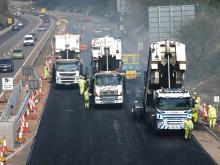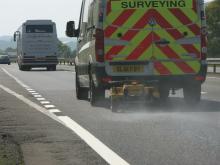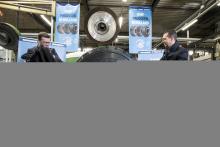A new type of road surfacing, called Poroelastic road surface (PERS), has been laid on a 15km stretch of the former E4 motorway near Linköping, Sweden.
The material combines small rubber particles and stones and is porous as 25% of its volume is air.
Tests by the Swedish National Road and Transport Research Institute (VTI) are said to have found that studded tyres do not wear down the surface faster than normal surfacing, and it produces almost no particles, while road noise is significantly reduced.
A new type of road surfacing, called Poroelastic road surface (PERS), has been laid on a 15km stretch of the former E4 motorway near Linköping, Sweden.
The material combines small rubber particles and stones and is porous as 25% of its volume is air.
Tests by the Swedish National Road and Transport Research Institute (VTI) are said to have found that studded tyres do not wear down the surface faster than normal surfacing, and it produces almost no particles, while road noise is significantly reduced.
The trial near Linköping is to test how the new material copes with heavy transport vehicles.









